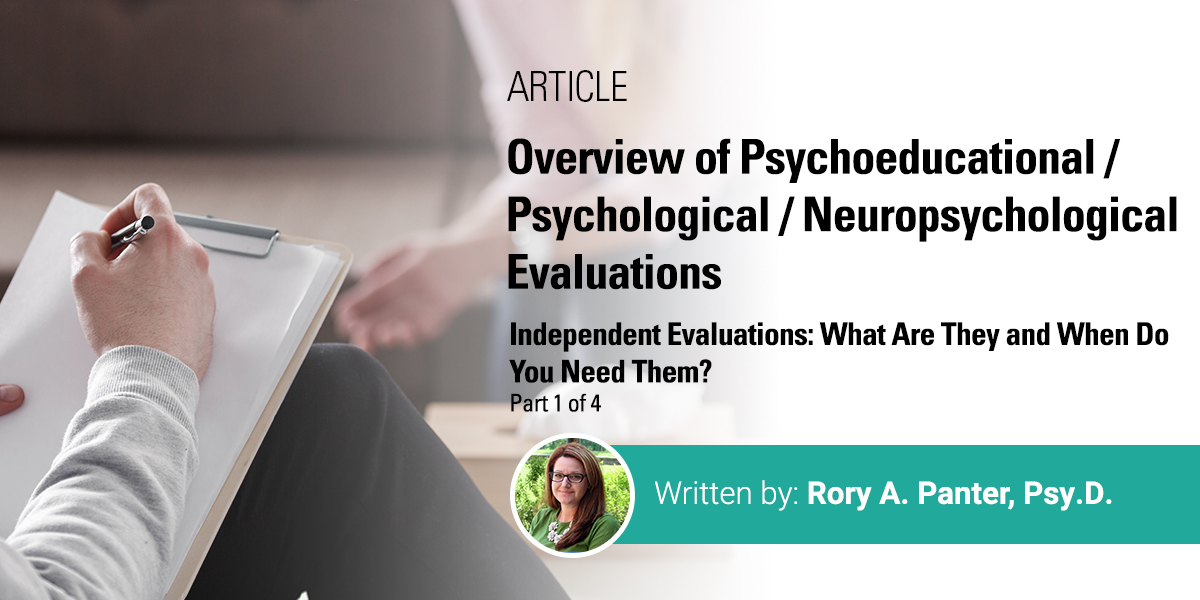Independent Evaluations: What Are They and When Do You Need Them? 1 of 4
Written by Dr. Rory Panter, Licensed Psychologist
In order to demystify the process of pursuing an independent evaluation it is important to first understand what exactly an independent evaluation is and why it may be needed. An independent evaluation is a comprehensive and objective evaluation conducted to gather information about an individual and their needs by a qualified professional. There are several benefits to having an independent evaluation conducted. A multi-component evaluation conducted by a single, experienced clinician can provide a 360-degree view of an individual as well as provide comprehensive and individualized recommendations, which are consistent with current best practices. While there are many types of evaluations, this series will explore four specific types of evaluations: Psychoeducational/Psychological/Neuropsychological Evaluations, Program Evaluations (sometimes also referred to as Independent Educational Evaluations), Functional Behavior Assessments, and Eligibility Evaluations.
We will first explore Psychoeducational / Psychological / Neuropsychological Evaluations. A Psychoeducational or Psychological Evaluation may be appropriate if you suspect difficulties at school (e.g., learning disability, intellectual deficiencies, behavior problems), work, home / community, or court-related referrals. Evaluations can be completed for individuals of all ages (young children through adults). Psychological Evaluations may also be necessary to determine eligibility for specific special education supports, school and test accommodations, work-related assistance, insurance reasons, and to determine giftedness. Psychoeducational/Psychological Evaluations consist of an individualized assessment designed to determine the child/adult’s specific strengths and needs and to yield information regarding the individual’s current levels of functioning. Gathering data about an individual’s cognitive, emotional, social, and behavioral functioning can be used for the purposes of diagnosis, classification, prediction, and intervention planning and monitoring. Depending upon the reason for referral, the following areas may be assessed: intelligence (IQ), academic achievement, personality, social-emotional, behavior and mental status. Referrals may come from a variety of sources, including parents, adult clients, physicians, attorneys, school personnel, and other psychologists.
Each of these evaluations is highly individualized and, therefore, the procedures used will be carefully chosen based upon the reason for referral. Psychoeducational / Psychological / Neuropsychological Evaluations include an “in-office component,” during which the individual completes a battery of assessment measures. This direct testing is given in a one-to-one format by an experienced clinician, typically a licensed psychologist or an experienced post-doctoral fellow under the supervision of a licensed psychologist. The evaluation may consist of at least several of the following: clinical interview with parent, child, and/or adult client; social-emotional and developmental history; behavior rating scales; intelligence (IQ) testing; academic achievement testing; assessment of working memory, attention, information processing, and processing speed; personality testing; play-based assessment; school observation and teacher interview (as appropriate); figures drawings; and a review of records. Collateral information is sought as well, including input from a treating therapist and/or medical specialist, and from school personnel (for a school-aged client).
Based on the results of the evaluation, appropriate recommendations are developed and shared with the parent and/or adult client. When a school has contracted for the evaluation, the results are also shared with appropriate school personnel, provide written consent has been provided. A formal, typed report of the results and recommendations is then provided. At a sharing/feedback conference, the results are reviewed with the parent and/or adult client and with school personnel if the school contracted for the evaluation.
For our next installment, we will explore Functional Behavior Assessments (FBA).

